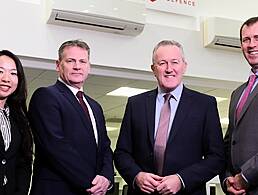We recently spoke to Claire Montgomery of G-P (Globalization Partners) about what diversity in engineering looks like in the age of remote work.
About a year ago, US employment tech company G-P (Globalization Partners) announced plans to double its headcount in Ireland less two years after setting up its European base in Galway.
With demand for its global recruitment management platform soaring as more and more employers looked beyond their home turf for new talent, the company announced the creation of 75 roles last October for a new Northern Ireland team.
G-P is on a mission to help companies hire anyone, anywhere. Alongside recruitment, its platform supports tasks such as onboarding, benefits administration, payroll and time and expense management.
Legal intricacies of a global workforce
While being able to hire anyone, anywhere gives employers a significantly bigger pool to choose appropriate talent from, it also means more legal work because of the intricacies of employment laws in different parts of the world. That’s where G-P comes in.
“We help break down borders and we help with legal, tax and HR jurisdictions so people don’t have to set up their own subsidiaries or branch offices,” Claire Montgomery, one of the company’s directors of software engineering, told SiliconRepublic.com recently.
She added that G-P is able to do this because it has people in about 187 countries to help companies with recruitment.
Based in Belfast, Montgomery leads a team of software engineers and is responsible for the payroll area within the platform. One of her key tasks is to build high-performance engineering teams that can work together on making their platform better.
One of her motivations to join G-P relates to a personal experience from the previous company she worked in. She had tried to recruit a candidate from Poland but could not because the company didn’t have an entity in the country.
“That’s where G-P comes in – because we’ve got entities in over 187 countries, we can become the employer of record for those employees in that country.
“Then we take away everything that a company needs to do to set up that entity. So, it’s really about having that entity within those countries. And with that comes the legal, the tax, the pay, all within that one entity.”
Diverse teams widen our perspective
Is simply having a certain number of people from other countries working on one team enough to ensure diversity? Montgomery doesn’t think so.
“I think diversity for me is definitely not about the numbers on the team. It’s really around how as a business we can have much more of a business impact when we have people of a range of diversities making up that team or that leadership team,” she said.
“Because then we think more like our customers, we have many more perspectives that we can apply to the problems that we’re trying to solve for both the business and our customers.
“And it’s really trying to get away from the terrible interview perspective that you could have where you’re kind of asking, ‘Is the person like me? Or is the person different?’”
But finding diverse talent, even for a global company like G-P, is easier said than done. Lack of diversity or encouragement of specific demographics such as women and ethnic minorities to study engineering at school and university levels also poses a challenge.
“Some of the challenges that we face are more systemic from the schools and the universities, where they’re not necessarily encouraging some of the minorities or females into the engineering subjects,” Montgomery said.
So, for us it’s really about how we can encourage, for instance, women who code to come through as our interns and graduates. And then also, having a diverse panel so that when candidates come in for interviews, they can see that diversity.”
In general, Montgomery said she prefers any engineering candidate who has a genuine interest in the business side of things as well as the technical aspects.
“They can really stand out by showing that they understand the business domain that they’re in, they understand the business impacts that they’re going to have. And also, that they’ve got really strong engineering practices,” she said.
“So on top of the coding skills those who are really showing how they have enterprise-scale skills – that’s where the engineers can really, really set themselves apart.”
10 things you need to know direct to your inbox every weekday. Sign up for the Daily Brief, Silicon Republic’s digest of essential sci-tech news.




